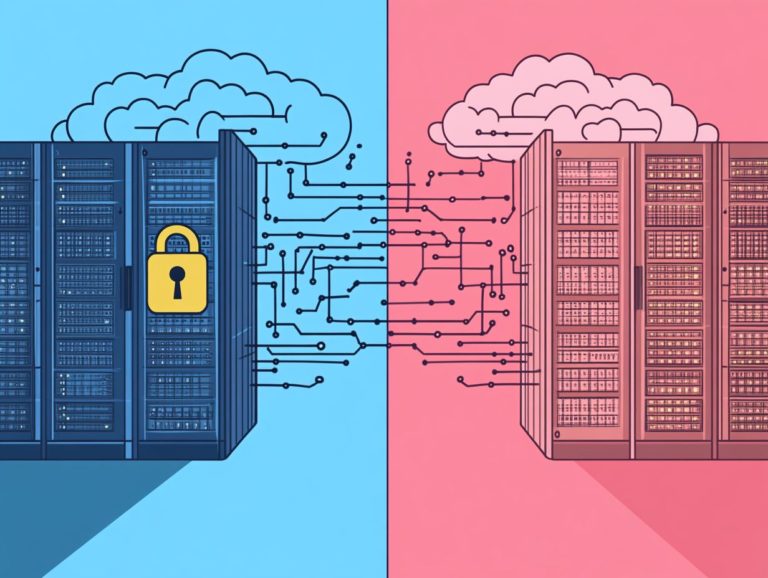Choosing Between AWS and Google Cloud: A Guide
In today s fast-paced tech landscape, choosing the right cloud service provider can significantly impact your business’s success. This guide presents a detailed comparison between AWS and Google Cloud, focusing on essential factors such as cost, scalability, reliability, and security.
You ll discover the specific features each platform offers, including compute and storage services, along with advanced analytics and machine learning capabilities. Real-world case studies showcase how various companies harness these technologies, empowering you to make a decision that aligns with your unique needs.
Whether you’re a startup or a well-established enterprise, this guide equips you with the insights necessary to select the optimal cloud solution for your organization.
Contents
- Key Takeaways:
- Key Factors to Consider
- Comparing Features and Services
- Case Studies and Real-World Examples
- Final Decision and Recommendations
- Frequently Asked Questions
- What are the main differences between AWS and Google Cloud?
- Wondering which platform is right for you?
- What factors should you consider when choosing between AWS and Google Cloud?
- What are the benefits of using AWS?
- What makes Google Cloud a great choice?
- Can I use both AWS and Google Cloud for my business?
Key Takeaways:
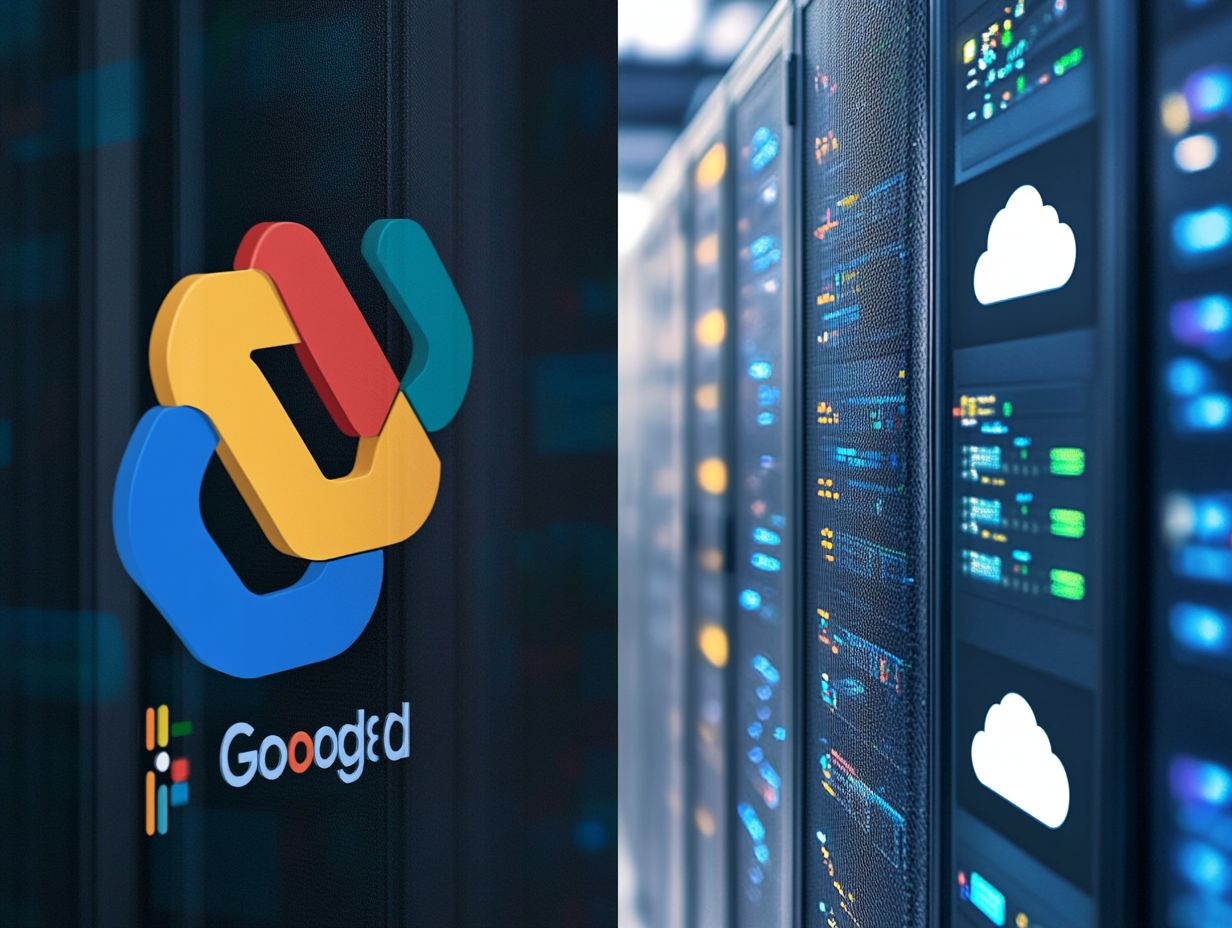
Consider cost, scalability, reliability, and security when choosing between AWS and Google Cloud. These factors are essential for ensuring the success of your business.
Both AWS and Google Cloud offer a wide range of features and services, but it’s crucial to compare cloud provider features to determine which one best suits your business needs.
Explore real-world examples and case studies of companies using AWS and Google Cloud to gain insights and make an informed decision. Tailor your final decision to factors specific to your business.
Overview of Services Offered
Cloud computing has transformed business operations, offering a wealth of services from top-tier platforms like Amazon Web Services (AWS), Google Cloud Platform (GCP), and Microsoft Azure.
These premier cloud providers deliver an extensive range of solutions, such as virtual machines for computing demands and a tool that helps manage groups of containers, which are lightweight and portable software packages. They also offer cutting-edge machine learning services that enable you to unlock the potential of AI.
With options like Amazon S3 and Google Cloud Storage for reliable, scalable data management, along with flexible billing solutions like Pay-As-You-Go and committed use discounts, you can easily tailor your cloud strategy to suit your specific business needs. Each provider brings unique strengths to the table:
- AWS: Offers a robust collection of services designed to cater to everyone from startups to large enterprises, featuring standout options like its Lambda function for serverless computing.
- GCP: Excels in big data analytics and machine learning, equipped with tools like BigQuery and TensorFlow for effortless, data-driven decision-making.
- Microsoft Azure: Provides seamless integration with familiar Microsoft products, boosting productivity with tools such as Azure DevOps and Azure Active Directory.
Collectively, these platforms support a variety of workflows, ensuring you can pinpoint the ideal cloud solution tailored to your operational needs.
Key Factors to Consider
When selecting cloud services, consider several key factors to ensure the chosen platform aligns seamlessly with your organization’s goals and budget. Start with the pricing model; options like Pay-As-You-Go and committed use discounts can greatly influence your overall costs.
Evaluate customer support, scalability, and the available billing options. These elements are essential for making an informed decision, especially in today s fast-paced business landscape.
Discover how these powerful tools can revolutionize your business operations! Start your cloud journey today by exploring these platforms!
Cost
The cost of cloud services is a top concern as you navigate various pricing models. Providers like Amazon Web Services (AWS) and Google Cloud Platform (GCP) offer flexible options, such as Pay-As-You-Go pricing and committed use discounts, leading to significant savings when used effectively.
Understanding these pricing models especially for services like flexible computing services and Google Compute Engine is crucial for managing your cloud costs.
Utilizing the Pay-As-You-Go approach allows you to adjust expenses based on actual usage. This adaptability is particularly beneficial for startups and smaller enterprises with fluctuating workloads.
Committed use discounts reward long-term contracts with reduced rates, which can be advantageous if your needs are predictable. Don t wait! Assess your usage patterns and growth carefully to avoid over-committing and incurring unnecessary costs.
Exploring various billing options, such as reserved instances or spot pricing, can further enhance your cost efficiency. Tailor your cloud strategies to your specific operational needs.
Scalability
Scalability is crucial for cloud services, enabling swift resource adjustments in response to changing demand. With tools like Kubernetes and serverless computing, you can easily scale your applications.
This flexibility allows you to meet operational needs without incurring unnecessary costs, making scalability a key factor in choosing the right cloud provider.
An e-commerce site can use Kubernetes to effectively manage significant traffic spikes during holiday sales.
Serverless computing provides automatic scaling, allowing you to handle unpredictable workloads effortlessly. Whether launching a marketing campaign or deploying a new service, instant scaling can transform your operations.
Choosing cloud providers that prioritize scalability helps maintain operational efficiency and reduces the risk of lost revenue during peak periods.
Reliability
Reliability in cloud services is vital for your business, especially for consistent performance and uptime. Carefully evaluate the Service Level Agreements (SLAs) from cloud providers, as these agreements outline uptime guarantees and support response times.
Understanding disaster recovery options gives you peace of mind, knowing your data and applications will remain accessible even during challenges, safeguarding your business continuity.
As you assess these SLAs, you may find that different providers offer distinct terms impacting your operations. Renowned platforms like AWS and Microsoft Azure provide robust disaster recovery solutions, streamlining recovery during outages.
Besides technical offerings, effective customer support is essential for enhancing reliability. Timely assistance can mitigate downtime and ensure swift resolutions during emergencies.
Ultimately, the harmonious relationship between dependable cloud frameworks and responsive support teams fortifies your business against unforeseen disruptions.
Security
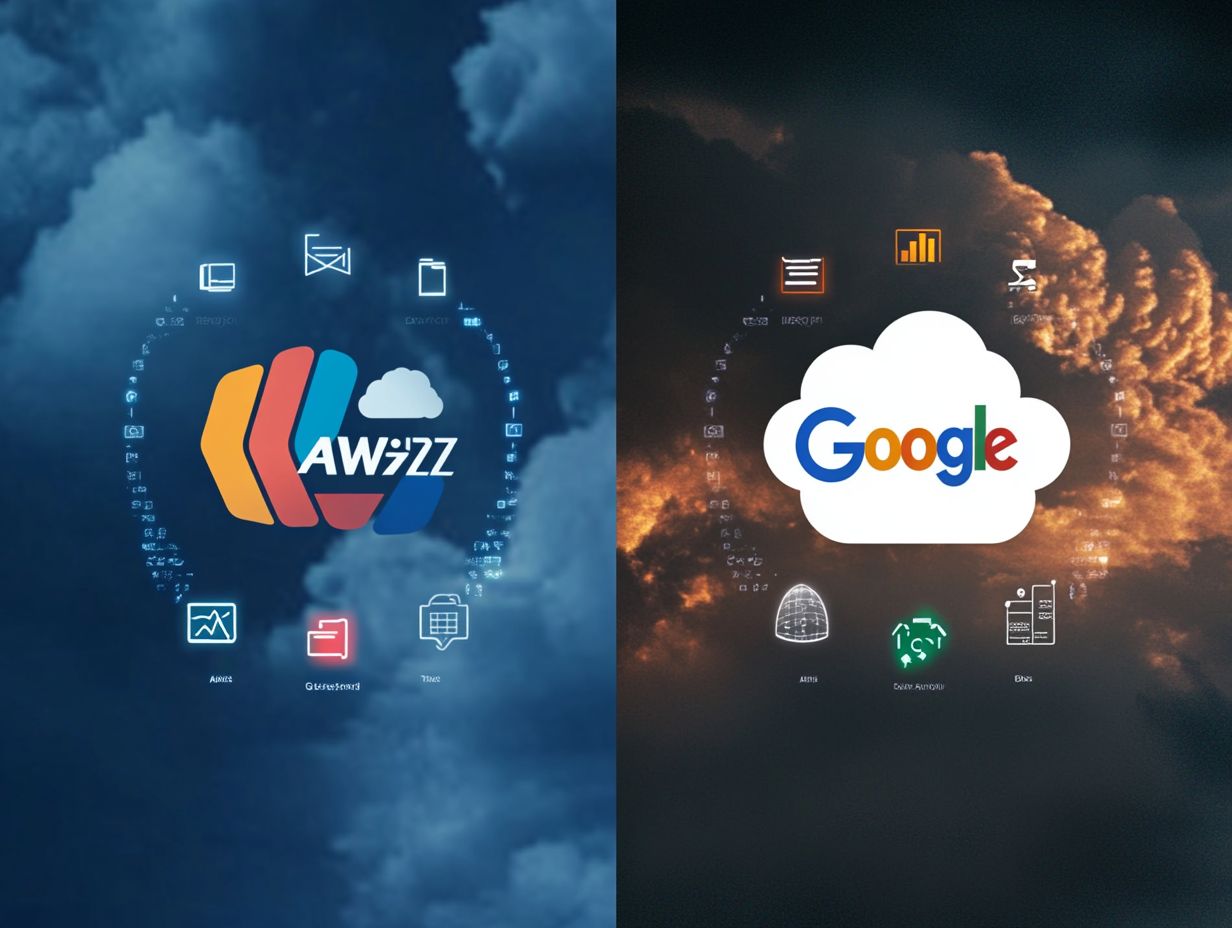
Security is an essential consideration for any organization utilizing the strength of cloud services. The ramifications of data breaches can be profoundly detrimental. To mitigate these risks, providers deploy robust data protection measures and compliance standards designed to safeguard your sensitive information.
Ongoing customer support and proactive security protocols are critical in ensuring that your business remains secure while fully leveraging cloud technologies.
It’s important to understand that the responsibility for security is a shared endeavor between your organization and your cloud service providers. This partnership is vital.
Providers equip you with sophisticated encryption, access controls, and multi-factor authentication, which is an extra layer of security that requires not just a password but also something only the user has, like a code sent to their phone, to protect your data from unauthorized access.
Adhering to industry regulations, such as GDPR and HIPAA, not only secures your clients sensitive data but also bolsters your provider’s credibility in the marketplace.
Effective customer support plays a pivotal role in this ecosystem, assisting you in navigating the complexities of security. It swiftly addresses any concerns, building trust and reliability, which is essential in today s digital world.
Comparing Features and Services
When choosing a cloud provider, it s essential for you to meticulously compare the features and services available to find the perfect match for your organization s needs.
Consider key categories of services:
- Compute Services, which include options like Elastic Compute Cloud and Google Compute Engine;
- Storage Services such as Amazon S3 and Google Cloud Storage;
- Database Services tailored for structured data management;
- Networking Services that ensure seamless connectivity;
- Analytics and Machine Learning Services designed to enable your data-driven decision-making.
Compute Services
Compute Services are at the heart of cloud platforms, delivering the essential resources needed to run your applications and workloads seamlessly. When you turn to Amazon Web Services (AWS), you gain access to Elastic Compute Cloud (EC2), while Google Cloud Platform (GCP) offers Google Compute Engine.
Both enable you to deploy virtual machines and tap into serverless computing, which is a cloud computing execution model where the cloud provider dynamically manages the allocation of machine resources, for scalable operations.
These services enable you to handle a variety of computing tasks efficiently, whether you’re hosting websites, processing vast amounts of data, or executing complex algorithms. AWS’s EC2 excels with its remarkable configurability and an impressive array of instance types designed to meet specific performance requirements.
On the other hand, GCP’s Compute Engine is praised for its smooth integration with advanced machine learning tools and its ability to live migrate instances, which minimizes downtime.
While both platforms boast powerful auto-scaling features, their pricing models differ significantly. Make sure to consider these differences in light of your projected workloads.
Many businesses are now adopting a multi-cloud strategy to boost performance and save costs, leveraging the unique strengths of both providers.
Storage Services
Storage services play a pivotal role in your cloud data management, allowing you to store, retrieve, and oversee your data with remarkable efficiency. In terms of options, Amazon S3 and Google Cloud Storage are two frontrunners, each offering scalable solutions tailored to meet diverse storage needs while ensuring high availability and durability.
As you weigh your choices, it s vital to consider the unique features and advantages these services provide. Amazon S3 shines in flexibility, delivering extensive integration capabilities with other AWS tools making it a favorite among enterprises already embedded in the AWS ecosystem.
Google Cloud Storage distinguishes itself with its seamless collaboration features and competitive pricing, appealing particularly to startups and small businesses that prioritize budget management.
By grasping these distinctions, you can align your storage strategy with your operational goals, maximizing both efficiency and value.
Database Services
Database services are essential in cloud architectures, providing tailored solutions for data management that meet diverse application needs. You have AWS’s Amazon RDS at your disposal, while Google Cloud offers Cloud SQL, both crafted to support databases organized into tables. This allows you to concentrate on your core business functions without the constant worry of database maintenance.
These services simplify the setup and management of databases, enabling your organization to scale effortlessly. Enjoy peace of mind with automatic backups, enhanced security, and straightforward replication across regions with AWS RDS an excellent choice for applications that require high availability.
Google Cloud SQL offers user-friendly features, providing smooth integration with other Google services and robust analytical tools.
For developers seeking a hassle-free setup, each option offers unique benefits tailored to specific workloads. This ensures that you can select the most suitable solution based on your specific needs and performance requirements.
Networking Services
Networking services play a crucial role in establishing secure and efficient connections in the cloud. With Amazon Virtual Private Cloud (VPC) and Google Cloud VPC, you can create isolated network environments that facilitate secure access to your resources while supporting VPN connectivity for remote access.
These services enable you to customize your network configurations, optimize performance, and enhance scalability. When evaluating these platforms, consider not just the capabilities they offer like subnetting, routing, and security group management but also their connections with a variety of other services within their ecosystems.
For example, Amazon VPC’s ability to interconnect with AWS Lambda enhances serverless architecture. Google Cloud VPC features, such as private service access, ensure smooth communication with Google services. Each platform offers unique benefits and security measures, making it imperative for you to conduct a comparative analysis to select the right cloud networking solution tailored to your specific needs.
Analytics and Machine Learning Services
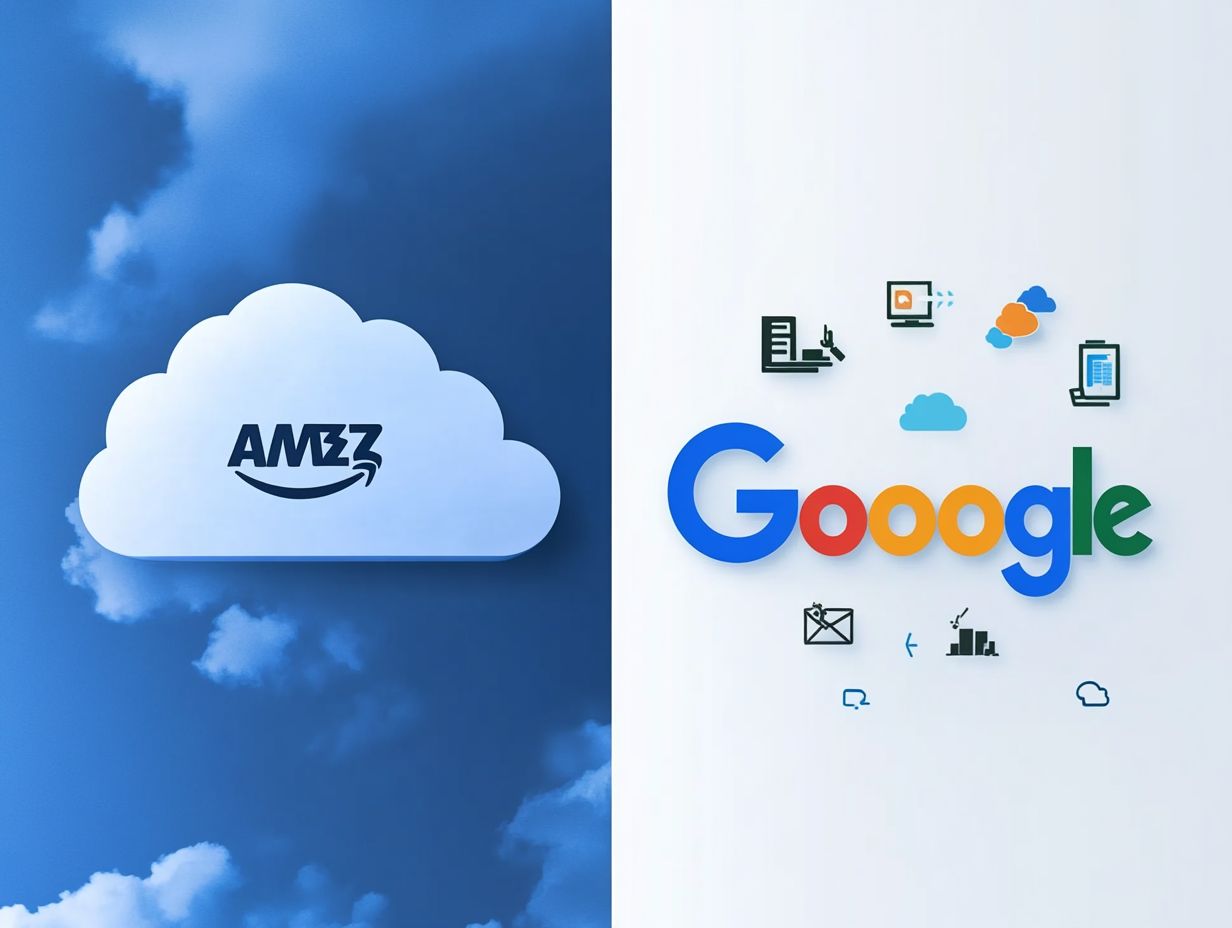
Analytics and Machine Learning Services enable you to extract valuable insights from your data while utilizing the strength of AI for smarter decision-making. Tools like Amazon SageMaker and Google BigQuery stand out in this realm, simplifying building, training, and deploying machine learning models.
These platforms enhance the model development lifecycle and integrate effortlessly with existing big data frameworks. AWS SageMaker boasts advanced features like automatic model tuning and built-in algorithms, making it suitable for a wide array of industries, from healthcare to finance.
In contrast, Google BigQuery excels at managing vast datasets, allowing you to execute complex queries at astonishing speeds.
By understanding the unique needs of your projects, you can assess whether SageMaker s customizable model management or BigQuery s robust data warehousing capabilities better align with your objectives. Don t miss out on boosting your decision-making with these powerful tools!
Case Studies and Real-World Examples
Discover how organizations thrive with cloud services through real-world case studies! These insights highlight distinctive strategies and results.
By exploring success stories from leading companies utilizing AWS and Google Cloud, you can uncover the benefits and challenges they faced during their cloud journey. Learn about the transformative impact of cloud adoption on their operations.
Companies Using AWS
Numerous organizations across various industries have embraced AWS, tapping into its powerful cloud services to elevate their operations and foster innovation.
Look at companies like Netflix and Airbnb; they stand as prime examples of successful AWS adoption. They utilize AWS’s scalable infrastructure, data analytics capabilities, and machine learning services to enhance performance and enrich customer experiences.
Take Netflix, for instance. They’ve harnessed AWS to manage vast amounts of streaming data. This enables the seamless delivery of content to millions of users around the globe. It not only reduces latency but also allows the platform to analyze viewing habits and refine recommendations, creating a more personalized experience.
Then there’s Airbnb, which relies on AWS to scale its backend services during peak traffic times. This ensures a dependable user experience. By employing services like Amazon S3 for storage and AWS Lambda for serverless computing, they illustrate how cloud technology can effectively streamline operations.
You can draw valuable lessons from these examples by recognizing the crucial role of flexibility and scalability in adapting to market demands and enhancing customer satisfaction.
Companies Using Google Cloud
Google Cloud has found favor among a diverse array of businesses. It elevates their operations with sophisticated data analytics and machine learning capabilities. For instance, Spotify and eBay exemplify how Google Cloud’s powerful tools allow them to optimize operations, glean deeper insights from data, and significantly enhance user experiences.
Another standout example is Snap Inc. It harnesses Google Cloud to meet its image and video processing demands. By leveraging Cloud Storage and BigQuery, Snap has dramatically increased its data processing speed. This enables real-time analytics that elevate user engagement on their platform.
PayPal turned to Google Cloud to streamline its financial services and bolster transaction security. They reap the benefits of a robust infrastructure crafted to handle sensitive data effectively.
These companies have seen impressive performance boosts and learned vital lessons in agile adaptation and collaborative innovation by integrating cloud solutions into their core business strategies.
Final Decision and Recommendations
Deciding on the right cloud provider requires careful review of your unique requirements. This includes cost considerations, scalability, and security needs.
You must assess the benefits and features of platforms such as AWS, Google Cloud, and Microsoft Azure to pinpoint the best match for your operations.
It’s essential to ensure that your selection aligns with your long-term strategy and budget constraints. Act now to ensure you choose the right cloud provider for your business needs.
Factors to Consider for Your Specific Needs
When assessing cloud providers, consider factors tailored to your organization’s unique needs. This includes the pricing model, customer support, and the range of available features. By carefully evaluating these elements, you can ensure that you select a cloud solution that meets your immediate requirements and fosters future growth and innovation.
Examine the scalability options your potential provider offers to accommodate increasing workloads and user demands. If your company anticipates rapid expansion, a provider that allows for seamless upgrades and additional storage can be invaluable.
Don’t overlook security protocols. A reliable provider should adhere to industry standards and implement robust encryption methods to protect sensitive data. It’s also crucial to evaluate compliance with regulations specific to your sector, as this can significantly impact your operational integrity.
Engaging in discussions with current users of a potential cloud provider can provide you with practical insights into performance and reliability, helping you make informed decisions.
Frequently Asked Questions
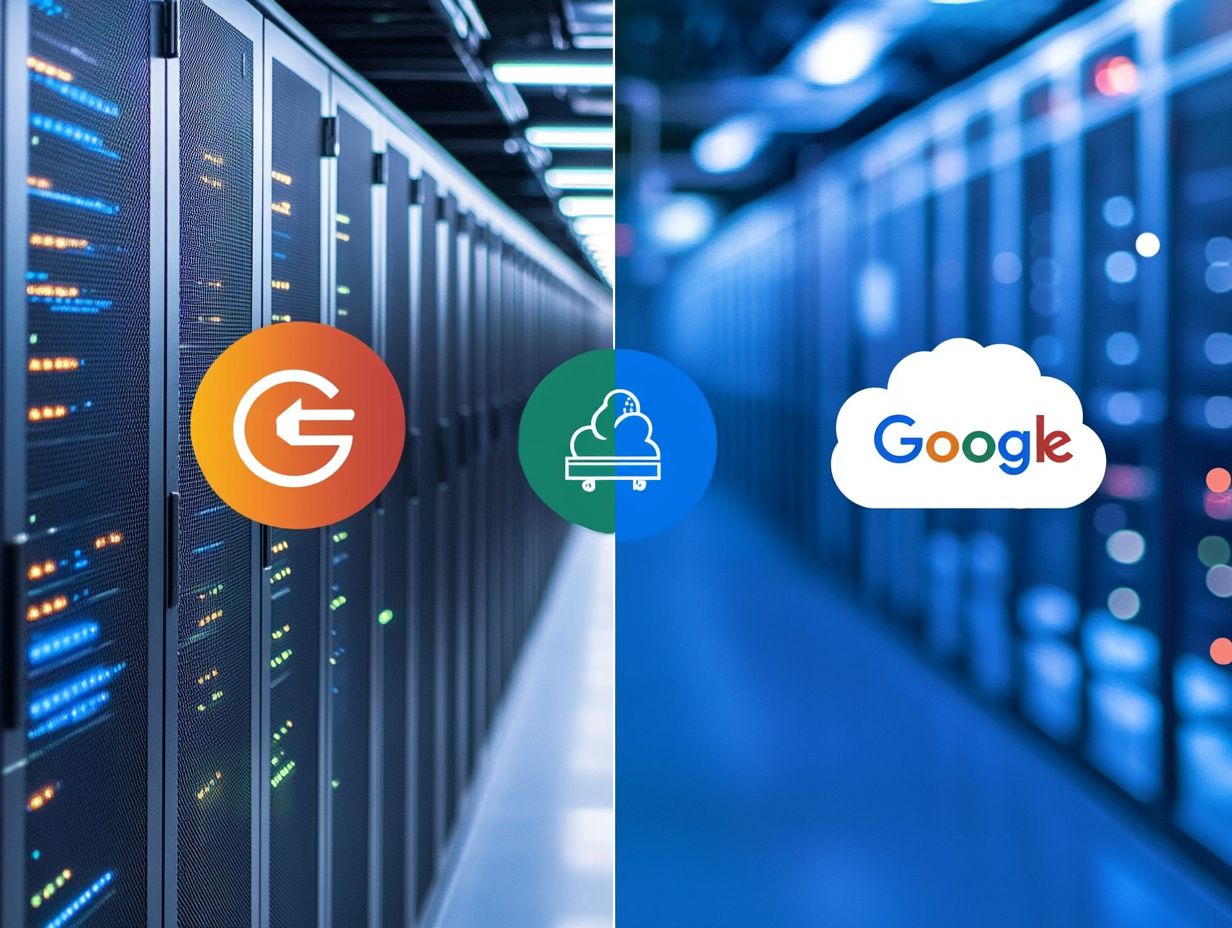
What are the main differences between AWS and Google Cloud?
The main differences between AWS and Google Cloud are their offerings and pricing models. AWS offers a wide range of services and has a pay-as-you-go pricing model, while Google Cloud has a more limited selection of services but offers discounts for long-term contracts.
Wondering which platform is right for you?
The best choice depends on your specific needs and preferences. AWS is ideal for those seeking a wide range of services and popularity. On the other hand, Google Cloud suits users familiar with Google products and those who prefer a simpler interface.
What factors should you consider when choosing between AWS and Google Cloud?
When deciding between AWS and Google Cloud, consider these key factors:
- Types of services needed
- Your budget
- Level of support and training available
- Specific features that align with your business needs
What are the benefits of using AWS?
Discover the power of AWS, which offers a vast selection of services and flexible pricing options. Strong security measures ensure your data is safe.
AWS boasts a large and active community, providing ample support and resources.
What makes Google Cloud a great choice?
Unlock your potential with Google Cloud! Its user-friendly interface makes it easy for beginners to navigate.
Google Cloud excels in advanced data analytics tools that help businesses make data-driven decisions. Plus, there are discounts available for long-term contracts and seamless integration with other Google products!
Can I use both AWS and Google Cloud for my business?
Yes! It’s entirely possible to utilize both AWS and Google Cloud. This approach can benefit companies needing a diverse range of services while avoiding reliance on a single provider.
However, managing and integrating both platforms may require additional resources and expertise.
Explore AWS and Google Cloud today to find the perfect fit for your business needs!





